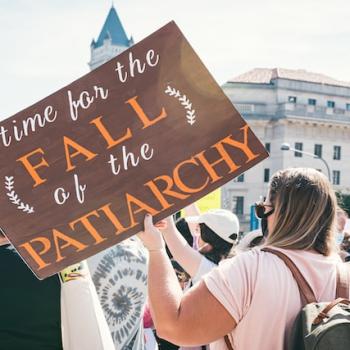
When we talk about religious authority, we need to talk about how to resist that authority when necessary. This includes avoiding casually authoritarian language in church, recognizing that religious authorities are not God, learning to “authorize” ourselves, and, simply, learning to say “no.”
One of the problems, though, with learning to say “no,” is that sometimes it comes with a side helping of shame. This shame might be mostly in our own minds. Or it might be something others are actively trying to cause us to feel.
“Setting the Wrong Example”
I was struck by a story Sue Monk Kidd tells in Dance of the Dissident Daughter. Monk Kidd was exploring the sacred feminine, finding life there in a way she felt blocked off from in the world of patriarchal Christianity.
But a (male) friend of hers, who is a priest, felt the need to tell her this: “By not being faithful to the church as you once were, you’re setting the wrong example for your children. They’ll be the ones to suffer” (p. 216).
Yikes. This might sound kind of extreme.
Since I don’t have children, I have not had to confront this particular type of shaming language personally—people telling me I’m harming my children. But it reminds me of when I worked in college ministry and was becoming LGBTQ+ affirming. Churchy authority figures took it upon themselves to express concern that I was “leading college students into sin.”
That’s shame, too, right there. And how much deeply shaming would this comment have been if it were directed at one’s identity as a parent, not just one’s work as a college minister.
Fortunately, Monk Kidd was able to identify and resist the priest’s shaming language. She offers this “translation” of his words: “I am a spiritual authority. I, therefore, know what’s best for you. What’s best is for you to get back in line. And I will try to get you there, if necessary by raising the specter of bad motherhood—the ultimate leverage” (p. 216).
Simply naming something for what it really is—naming something as shaming—can be an important step toward resisting that shame.
Authorities Who Shame Are Not Worth Following
There are lots of good ways to lead a faith community well. Every leader develops their own style over time. There’s room for many different expressions of authority, and there are many different forms a healthy relationship between a religious authority figure and the people in the community they lead can take.
Shame is not one of these ways.
This feels like a reasonable boundary to set, if we’re part of a religious community. Shame should not be used as a motivating (to put it nicely) or controlling (to put it less nicely) force.
This goes for church leaders in communities we’re part of—and also, more broadly, for anyone we might look to for spiritual guidance: friends, family members, pastors, faith writers we follow on Instagram.
(Side note: feel free to find me on IG at @lizcoolj and @postevangelicalprayers and follow if you like. But no shame if not, lol.)
We deserve better than leaders who shame. No one deserves to have the “specter of bad motherhood”—as Sue Monk Kidd puts it so memorably—raised in their face.
And, milder as it may be, I didn’t deserve to be told I was “leading students into sin,” as my former church leaders put it.
We deserve religious leaders—and people in our lives in general—who care about and support us in our spiritual journeys. Even if those journeys take us places they haven’t been or aren’t sure they want to go.
And we deserve religious leaders who respect the reasons why we have come to the conclusions we have come to, even if different from theirs. Preferably, religious leaders who are very slow to place labels of “sin” on things they feel threatened by but perhaps don’t quite fully understand.
Learning to Say “No” Without Shame
When we start saying “no” not just to the small things, but to the bigger things—things like LGBTQ+ exclusion in my case, and patriarchal religious traditions in Sue Monk Kidd’s case—we will likely get pushback.
When this happens, we can learn to say “no” not just to the things we need to say “no” to, but also to the shame that might accompany this “no.”
As Brené Brown writes about in I Thought It Was Just Me (But It Isn’t), it helps to build “connection networks”—to identify and reach out to people who help us build “shame resilience” by listening well, affirming us, and empathizing rather than shaming.
Ideally, religious leaders could be part of these connection networks. But at the very least, they need not be among those who reinforce shame. If they are, it may be time to jump ship.
Any healthy relationship with authority involves the power of the people to say “no.” And no healthy relationship with authority is steeped in shame. Authority figures who are operating in healthy ways do not try to use shame to control people. We can learn to say “no” to religious shame.












